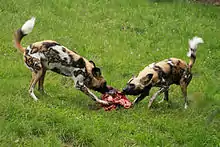Lycaon (genus)
Lycaon is a genus of canid which includes the African wild dog (Lycaon pictus) and the extinct Lycaon sekowei. This hypercarnivorous and highly cursorial genus is distinguished by accessory cusps on the premolars. It branched from the wolflike canids lineage during the Plio-Pleistocene. Since then, Lycaon has become lighter and tetradactyl, but has remained hypercarnivorous. Lycaon sekowei is known from the Pliocene and Pleistocene of South Africa and was less cursorial.[1] Some authors consider the extinct Canis subgenus Xenocyon as ancestral to both Lycaon and Cuon.[2][3]:p149
| Lycaon | |
|---|---|
 | |
| African wild dogs | |
| Scientific classification | |
| Kingdom: | Animalia |
| Phylum: | Chordata |
| Class: | Mammalia |
| Order: | Carnivora |
| Family: | Canidae |
| Subfamily: | Caninae |
| Tribe: | Canini |
| Genus: | Lycaon Brookes, 1827 |
| Species | |
| |
See also
- Lycaon of Arcadia, a figure from Greek mythology who was transformed into a wolf
References
- Hartstone-Rose, A.; Werdelin, L.; De Ruiter, D. J.; Berger, L. R.; Churchill, S. E. (2010). "The Plio-Pleistocene Ancestor of Wild Dogs, Lycaon sekowei n. sp". Journal of Paleontology. 84 (2): 299–308. doi:10.1666/09-124.1.
- Cherin, Marco; Bertè, Davide F.; Rook, Lorenzo; Sardella, Raffaele (2013). "Re-Defining Canis etruscus (Canidae, Mammalia): A New Look into the Evolutionary History of Early Pleistocene Dogs Resulting from the Outstanding Fossil Record from Pantalla (Italy)". Journal of Mammalian Evolution. 21: 95. doi:10.1007/s10914-013-9227-4.
- Wang, Xiaoming; Tedford, Richard H.; Dogs: Their Fossil Relatives and Evolutionary History. New York: Columbia University Press, 2008.
| Wikispecies has information related to Lycaon. |
| Wikimedia Commons has media related to Lycaon (genus). |
This article is issued from Wikipedia. The text is licensed under Creative Commons - Attribution - Sharealike. Additional terms may apply for the media files.